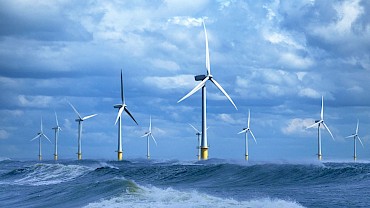Oil giants BP & Total win offshore wind leases in Britain
 Two giant oil companies won the largest share of options to build new offshore wind farms awarded by Britain on Monday, investments that are expected to eventually total in the tens of billions of dollars.
Two giant oil companies won the largest share of options to build new offshore wind farms awarded by Britain on Monday, investments that are expected to eventually total in the tens of billions of dollars.
The options were a big move by major petroleum producers into an industry that has for years been dominated by smaller, specialized companies.
The winning bidders, including BP and the French oil company Total, agreed to initially pay a total of 879 million pounds (about $1.2 billion) in deposits to develop offshore wind farms that will provide sufficient power to light up seven million homes.
The announcement was made by the Crown Estate, the organization that manages the properties on behalf of the queen and the British government. The undersea tracts are part of a large portfolio of properties owned by the British monarchy. Most profits go to the government, with around 25 percent going to pay the sovereign’s expenses.
The high amounts paid for options to build on six offshore plots surprised observers. It appeared to be a sign of both the strength of the British wind market and the eagerness of oil companies to get into the business, said Soeren Lassen, head of offshore wind research at Wood Mackenzie, an energy research firm.
“This is a very strong and clear sign of the attractiveness of the offshore wind sector,” he said. Offshore wind, which has existed as an industry for only about three decades, has advanced into the mainstream of large scale electric power generation.
The oil companies are piling into offshore wind because they reckon that investing in massive facilities capable of providing clean power for millions of homes can quickly advance their commitments to reduce the overall carbon emissions of the energy products they produce and sell.
The companies are accustomed to spending $10 billion or more on energy projects, and their eagerness to lock up offshore tracts may also be driving up prices in an industry previously known for frugality.
Key offshore players like Orsted, the Danish company that is the largest offshore wind developer, failed to win any acreage in the auction. In a statement on Monday, the company’s deputy chief executive, Martin Neubert, criticized the prices paid as “unsustainably high.”
The oil giants appear to believe that it is worth spending substantial sums to gain access to favorable sites. Dev Sanyal, BP’s executive vice president for gas and low carbon energy, said in an interview that offshore wind would be the energy sector’s “fastest-growing business over the next 20 years.”
Mr. Sanyal also said building and maintaining turbines at sea fit well with BP’s legacy skills in drilling for oil in the North Sea off Britain and other areas. Although the company is shedding 10,000 jobs as it gradually reduces oil production, it is installing some former oil and gas operators into critical roles in its renewable-energy businesses.
BP estimates that it will pay £1.8 billion over four years for the rights to two tracts in the Irish Sea that it won with a partner, Energie Baden-Württemberg, a German utility. During that time, it will work through permissions and other planning. The turbines are expected to begin generating power after seven years.
Mr. Sanyal called the large upfront payments “relatively small” in the context of the overall capital costs for the projects of “many billions.” Oil companies often shell out princely sums for access to resources before drilling operations begin.
BP paid the highest price per unit of potential power generation for the two tracts that it won. The company argues that these areas, which add up to about 300 square miles of seabed, are likely to have the lowest development costs and, therefore, higher profits because they are in shallow water about 20 miles from the coast of North West England.
Total was the top bidder for a large tract in the southern North Sea in partnership with an arm of Macquarie, a financial firm.
BP and Total are rapidly expanding their offshore portfolios as part of commitments to help mitigate emissions. Last year, BP paid $1.1 billion for a half-share of the offshore business that Equinor, the Norwegian oil company, has established off the east coast of the United States. The companies were recently tapped by New York State to supply power from two large wind farms in the Atlantic.
RWE Renewables, a German utility, won two large swaths of seabed awarded by Britain on Monday.
The companies will pay annual fees while developing their projects and then 2 percent of their revenue, according to the Crown Estate.
Orsted suggested that high prices reflected a lack of sufficient opportunities to meet demand. “Appetite in this leasing round by far exceeded supply, resulting in unsustainably high front-end costs,” Mr. Neubert said in the statement.
RenewableUK, a trade group, also found fault with the auction process, warning it might “mean higher costs for developers and consumers.”
The critics say that, in essence, the Crown Estate did not put enough potential lease areas up for auction and that forced prices higher. But the estate’s chief executive, Dan Labbad, argued that moving too quickly might risk damaging the marine environment.
“There are a lot of uses for the seabed that need to be respected; otherwise, we will be creating new problems for the future,” he said.
You can return to the main Market News page, or press the Back button on your browser.

